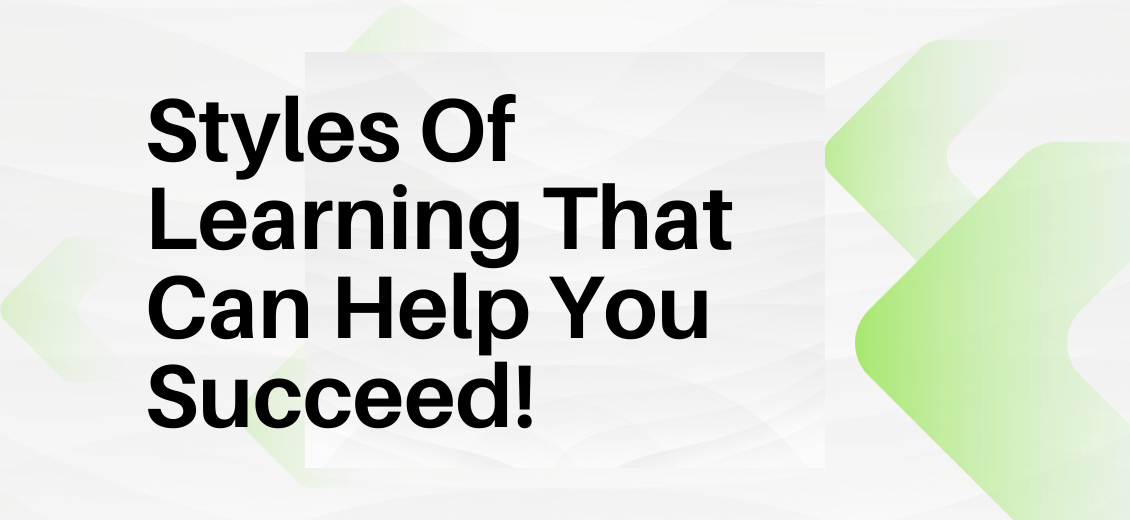Styles Of Learning That Can Help You Succeed!
Blogs Home
- 26 Nov 2021

Students try to get the best results, work in every possible direction to make things easier and comprehensive. Most students try to embrace various learning styles and eventually discover their comfort zone from which they can derive the best outcomes. Decades of studies have proven that people respond differently to different learning patterns. These learning patterns have been noted to generate effects on individuals apiece and even in combination. While some might need a good dose of verbal lecture, they might also need some visual understanding along with it; while some may be comfortable with only one of them.
Most of our subjects are based on practical learning and future experience and expansions in different spheres. Therefore, it is crucial that the future holders of a nation or the world as a whole properly understand the fundamentals of their subject. This not only helps in cracking through exams but also assists and accompanies a person throughout life. The knowledge we gain in our academic years helps us practically understand and relate to real-life situations and compels us to find or invent solutions based on our previous learning and later acquisitions.
This alone comes as an achievement for people and they feel a sense of accomplishment after using their knowledge for good. Before reaching the final stage, as students, it is first important to understand what learning style is beneficial to them, or do they need to include any of these learning styles or if they should exclude something in order to accommodate what they learn anew.
The well established ‘7 learning styles’ theory supports the idea of influence of different learning styles on individuals. Each of them focuses on personal development and social aspects. This theory has served its purpose for many and has even helped students from different spheres understand concepts well and generate results effectively.
Types of learners, according to the ‘7 learning styles’ theory:
Visual Learners
Also known as spatial learners, they grasp information from what they visually perceive. They need aids from graphics, images and diagrams to better understand the details. Instead of accommodating knowledge from words, these learners remember in pictorial representations. Such forms of graphics involve tables, charts, diagrams, maps and more.
These learners have a good understanding and can decipher the meanings behind pictures. They enjoy visual stimulation. However, since visual learners are more focused on graphics there is a tendency that they might miss minute details that are important for any aspect.
For learners who think that they are more inclined towards visuals and images can strengthen their performance by carefully taking advantage of their ability to read codes, aptitude to remember pictures, the brilliance to read maps and charts and skill to understand tables.
Aural Learners
Also known as auditory learners, they have a connection with sound and tend to perceive information through what they hear. These learners learn through what they hear and have a keen sense of music and musical instruments. They are observant hearers and develop their knowledge through conversations, orations and more. Such learners are ideal for school and university environments where they grasp things through lectures and diction.
They enjoy discussions and multimedia sources for explanations that are also more verbal. Students who find themselves inclined towards oral discussions and prefer auditory mediums can use methods like question answers, reading aloud, debates, podcasts, recitation and more, to improve their academic performance.
Social Learners
These learners share a connection with their surroundings and tend to learn from social interactions. They are extroverts and easily mingle with people. These learners perceive information by communicating with and forming an idea based on different perceptions of people.
They are critical, collaborative, understanding and reflective. These types of learners develop knowledge through group discussions and are usually good at jobs assigned to them where they work in teams. They work in coordination with others and process information by reading or understanding people.
Book clubs, group discussions, group study, social engagement, debates and more, can help these types of learners improve their performance.
Solitary Learners
These types of learners are independent learners and usually enjoy their own comfortable and solitary environment to study and learn. They work methodically according to their comfort as they are self-conscious and know exactly what they need to receive information.
These types of learners find it distracting and not convenient to be around people in their personal and academic lives.
For learners who like to work alone have really strong self-management skills and often correctly acknowledge their individual capacity to learn and acquire knowledge.
For such learners, it is important to assign goals for themselves, enjoy a separate physical space, go on field trips, visit libraries, collect relevant and helpful study material and always plan a schedule to prioritise major concepts. This will help such learners boost results.
Verbal Learners
These learners are masters of words, whether it is oration or writing they know how to understand through reading and learn from it. They grasp words better than music or rhythm and yet are somewhat similar to auditory learners. These learners have a rich vocabulary and can easily comprehend the underlying details in a text.
They very well know how to express their ideas and how to grasp information through texts and readings. Verbal learners are also good at remembering quotes, rhymes, names and more.
For such learners it is important to read books, open up to new concepts and ideas, read loudly and clearly, join study groups, surf through dictionaries, play word games and more!
Logical Learners
Learners who work strategically and have strong reasoning skills are referred to as logical learners. These students can practically solve complex problems whether it is concerned with how to plan & plot something or how to analyse a complex situation. These types of learners are great at problem-solving and can even take care of mathematical concepts easily.
They are systematic and have a unique style of addressing issues. They are good at solving riddles and often find answers in the most unexpected corners. They are inclined and focused on facts. They imagine everything meticulously and are good planners.
For such learners it is important to seek evidence, find hidden meanings, solve riddles, work on puzzles, use visuals to understand concepts, to solve mathematical problems, to organise a set of information and to find connections between various sets of information to exercise and shape their logical minds.
Realising your potential and ability to deal with the styles of learning is very crucial for every student. Working with the wrong style without understanding your true style requirements can affect your results adversely. And so that your hard work does not go in vain, it is significant to opt for styles that you are comfortable in. Do let us know in the comments what your most preferred style of learning is and why!

Shrishti Gupta




